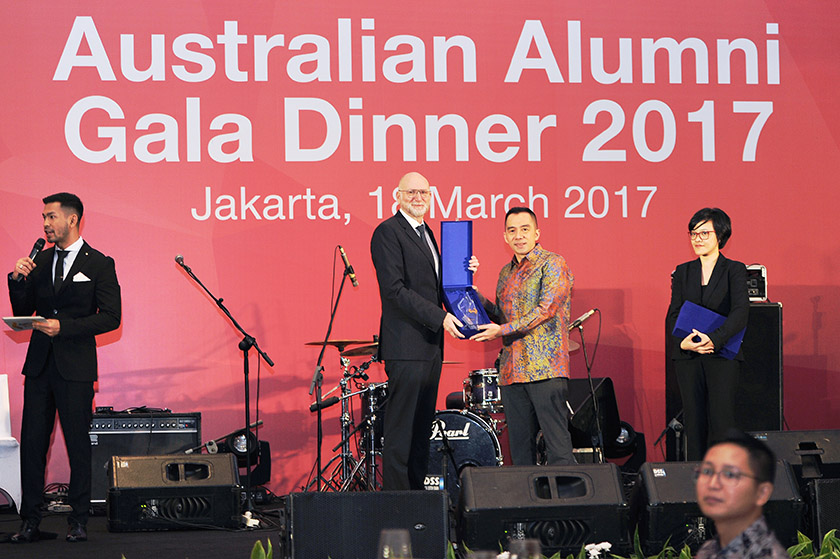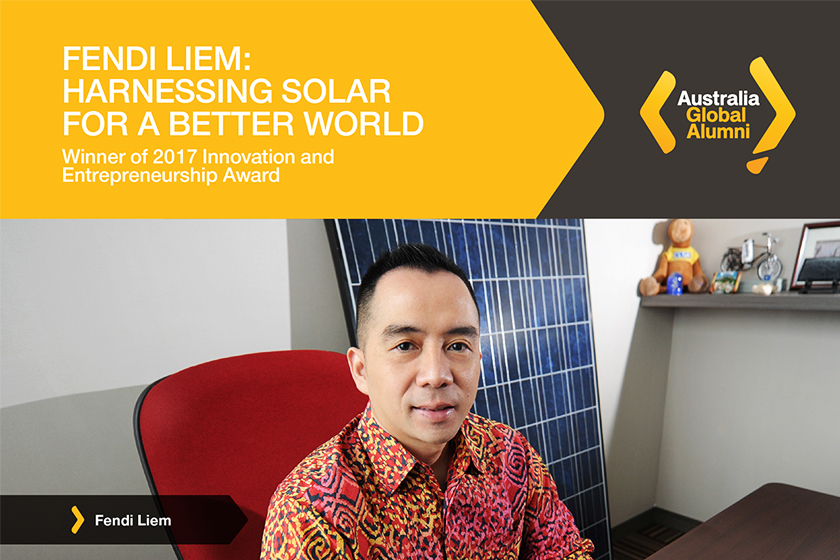Harnessing Solar For a Better World
Indonesia is located on the equator with a relatively even climate all year round, but the Southeast Asian nation is a late bloomer when it comes to tapping its solar energy potential. Alumni Awards winner in Innovation and Entrepreneurship, Fendi Liem, saw this as an opportunity.
Fendi, 40, founded PT Selaras Daya Utama (Sedayu), with two staff; a secretary and an office assistant. Now the fledgling company has successfully built over 100 solar farms all over Indonesia.
In reference to his Alumni Award, Fendi said “I appreciate this recognition from the Australian Government. For us, this is more than recognition, this motivates us to achieve more,” he said.
In 1999, Fendi graduated from the University of New South Wales in Sydney, majoring in computer science. He landed a job with professional services firm PricewaterhouseCoopers Consulting and specialised in mergers and acquisitions for six years. Last year, he completed a short course in Transformational Business Leadership - A Course for Outstanding Alumni of Australian Universities under an Australia Awards scholarship.
After living in Australia for 11 years, he decided to return to Indonesia to pursue his dream to set up his own renewable energy company, but it did not happen right away.
“I was away too long, I didn’t know anybody and had no network,” he said. “So, I ended up working for others while building my network.”
Fendi worked for Peter Gontha, Indonesian business identity and current Indonesian ambassador for Poland, and other Indonesia’s leading private equity management firms and media companies.
In 2009, Fendi was ready. It took about a year before he landed his first project with the state-owned electricity firm Perusahaan Listrik Negara (PLN). Later on, he started to get projects from the Ministry of Energy and Mineral Resources, Bank Indonesia, PT PP (Persero), PT Pertamina (Persero) among others.
By 2016, Fendi’s company had built 120 solar farms for isolated areas in Indonesia, and achieved international accreditations.
“It wasn’t easy to start,” he remembers. “I moved from a consulting firm where we sat on the high floor of a Sydney high-rise, looking over Darling Harbour, flew everywhere in business class.”
However, he gets more personal satisfaction from his current work.
“Most of our projects are in remote areas where there are no hotels, so we stay with local residents,” Fendi said.
“I always try to be there when they flick the switch for the first time. The feeling I get when I see those faces is priceless. At the same time I also feel sad when I realise that they should have received electricity much earlier.”
Renewable energy in Indonesia is still in its infancy compared to neighbouring countries.
Indonesia has committed to using 23% renewables by 2025, but currently uses only around 5% in its energy mix. Fendi says more incentives must be introduced to overcome an uphill battle for renewable energy in Indonesia and in order to bolster low supply and to meet growing consumption of energy head on.
In the future, Fendi hopes to collaborate with Australia as “a leader in solar technology”, and a promising area for cooperation that hasn’t been fully tapped into between the two countries.
Fendi now also shares his knowledge as guest lecturer with students at the Bandung Institute of Technology School of Business and Management, Atmajaya University and Surya University. “They are the future leaders, so hopefully once they become decision makers they will adopt renewable energy.”



 Fendi Liem: Winner of 2017 Innovation and Entrepreneurship Award
Fendi Liem: Winner of 2017 Innovation and Entrepreneurship Award
